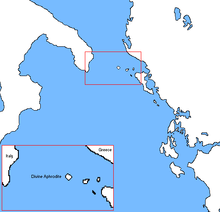Difference between revisions of "Divine Aphrodite (island nation)"
From NSWiki
| Line 31: | Line 31: | ||
'''Divine Aphrodite''' (Greek: Θεία Ἀφροδίτη), known simply as '''Aphrodite''' by it's residents, is a small island in the [[wikipedia:Ionian Sea|Ionian Sea]], westwards from the islands of [[wikipedia:Corfu|Corfu]] and [[wikipedia:Othonoi|Othonoi]], as well as Greece itself. | '''Divine Aphrodite''' (Greek: Θεία Ἀφροδίτη), known simply as '''Aphrodite''' by it's residents, is a small island in the [[wikipedia:Ionian Sea|Ionian Sea]], westwards from the islands of [[wikipedia:Corfu|Corfu]] and [[wikipedia:Othonoi|Othonoi]], as well as Greece itself. | ||
| + | |||
| + | ==Etymology== | ||
| + | The name originates from their worshipped goddess, [[wikipedia:Aphrodite|Aphrodite]]. Prior to 1571, it was simply named ''Aphrodite'', and again prior to that, ''Aphrodite Pandemos'', or ''Common Aphrodite'', for the idea that she holds relation to the citizens. It is believed this is the origin of Plato's distinction of two Aphrodites (Ourania and Pandemos). | ||
[[category:Nations]] | [[category:Nations]] | ||
Revision as of 22:52, 13 July 2014
| This page is a work in progress by its author(s) and should not be considered final. |
| Theocracy Of Divine Aphrodite Θεία Ἀφροδίτη
|
||||
|---|---|---|---|---|
|
||||
| Motto: A Heart That Loves Is Always Young | ||||
| Anthem: The Herald Of The Goddess | ||||
Divine Aphrodite's location within the Adriatic Sea.
|
||||
| Capital | Carthonia | |||
| Official languages | Greek ∙ English | |||
| Demonym | Aphrodites | |||
| Government | ||||
| - | Queen | Elena Pallas | ||
| Area | ||||
| - | Total | 12 km2 5 sq mi |
||
| Population | ||||
| - | census | 2,880 | ||
| Currency | Euro (EUR) |
|||
| Time zone | EET (UTC+2) | |||
| - | Summer (DST) | EEST (UTC+3) | ||
| Calling code | +301 | |||
| Internet TLD | .da | |||
Divine Aphrodite (Greek: Θεία Ἀφροδίτη), known simply as Aphrodite by it's residents, is a small island in the Ionian Sea, westwards from the islands of Corfu and Othonoi, as well as Greece itself.
Etymology
The name originates from their worshipped goddess, Aphrodite. Prior to 1571, it was simply named Aphrodite, and again prior to that, Aphrodite Pandemos, or Common Aphrodite, for the idea that she holds relation to the citizens. It is believed this is the origin of Plato's distinction of two Aphrodites (Ourania and Pandemos).


